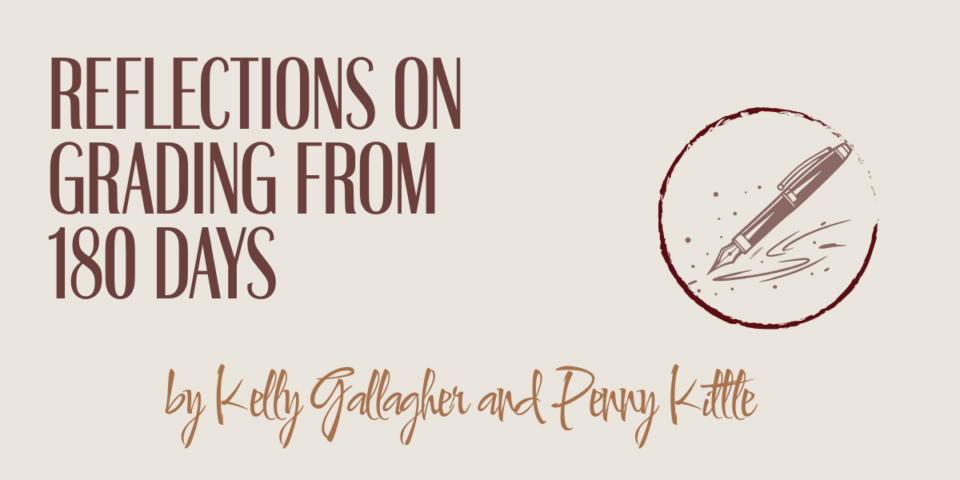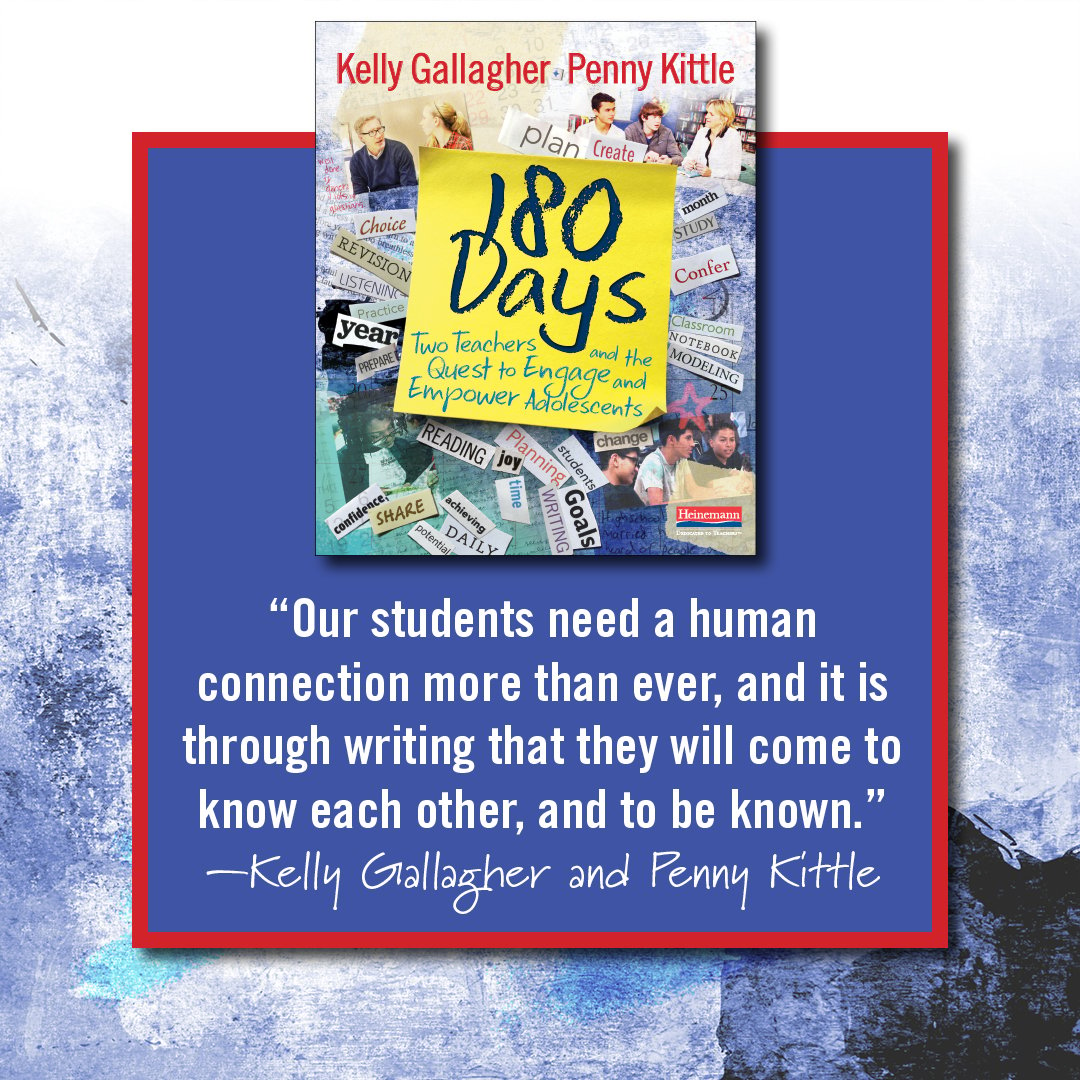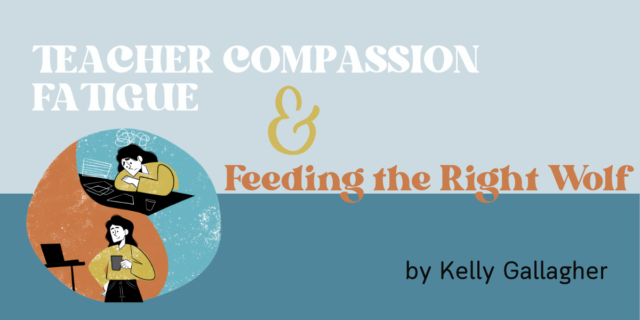
During the pandemic crisis, there is an opportunity to rethink instruction, assessment, and evaluation. The challenges of grading may seem small next to checking on our students’ health and well-being and the need to assess their access to technology in order to meet the expectations of remote and hybrid teaching. There is a lot we need to assess before we think about grading. Grading, however, remains a primary means of communication between teachers, students, and parents.
As we begin a school year we think about our grading practices along with expectations for daily reading and writing. We don’t wait to think about evaluation, we consider what and how we will assess as we plan each unit. Although written before the pandemic, Chapter 5 of 180 Days provides ideas that can help clarify and prioritize thinking even during this unprecedented time. In this excerpt we remind teachers to maintain a reflective, thoughtful stance toward grading.
Grading Doesn’t Teach
We both believe in grading less and assessing more. Students are hungry for responses that encourage, that nudge, that let them know their writing is heard and appreciated. Placing a grade on a student’s paper doesn’t teach him to write with more clarity and vision; a grade does not teach. The work of a writing teacher is response and encouragement.
But the world, of course, is hungry for grades. In many schools, administrators and parents demand more grades, and they insist that these grades be posted digitally for 24/7 access. Some administrators require teachers to post a minimum number of grades weekly, and the message seems to be that the more grades that are posted, the harder the teacher must be working. The more grades that are posted, the more kids must be progressing.
Let’s be clear: More grading does not mean better teaching is happening or that learning is occurring. Grades sort winners (As and Bs) from losers (Ds and Fs), but they don’t make our students better readers and writers (and in some cases they impede their progress). Today’s students are tested (and graded) more than ever, yet one in four who make it to college will be enrolled in remedial courses. Nearly half of these students hail from middle- and upper-income families, dispelling the widely held belief that only low-income or community college students are saddled with remedial courses (Education Reform Now 2016). Today’s students—perhaps more than any other students—have been graded and graded and graded, yet their reading and writing skills are not strong enough for college success. Voluminous grading of crappy writing (often essays about fake reading) does not change the fact that the writing is still crappy.
Given the political worlds in which we teach, we must assign grades, but thoughtful planning about how, what, and why we’ll grade is essential if we want our students to become better readers and writers.
We share seven principles of grading that inform our work and make grades as meaningful as possible. These seven principles can still guide grading during the pandemic:
- Students Need a Volume of Ungraded Practice
- Students Need Practice in Reading Like Writers
- Students Need Feedback
- Not All Work Is Weighted Equally
- Grades Should Tell the Truth About Progress
- Rubrics Are Problematic
- Best Drafts Receive Limited Feedback.
These principles, some perhaps surprising, help us concretely connect the actual progress students make—the work they are doing day in and out—to the letter on their report cards, and these principles are important no matter the instructional setting.
We show exactly how we put these principles into action across the most important work students do in our English classrooms. We also show how we set up our grade books. We close this chapter with the following.
Our mantra in a profession dedicated to the love of reading and writing should be to embrace experimentation and practice—lots of both—and to minimize, shrink, reduce, and if we had our way, eliminate grading. The increase in testing in the last decade has been considerable—anyone who has been in teaching that long has seen it happen—but the 2012 National Assessment of Educational Progress (NAEP) results show that even with all of that grading, there has been no significant increase in proficiency. These results remind us of a farmer’s wisdom: you don’t fatten a pig by weighing it. Grading is not worth all the energy it steals from us.
Evaluation and testing eat up time that is better spent reading, writing, and talking. We steal time from our daily essential practices with students to measure their progress. We steal time from our own reading and writing in order to mark those tests and submit those grades. Worry about performance inhibits creative thinking and leads writers to choose the easiest path to finish. In contrast, expansive thinking develops over time. Constant evaluation teaches students to be dependent on a teacher’s judgment, instead of their own.
We worked hard to try to find the proper balance between the evaluation required of us by our schools and the authentic practices we believe are essential in building literate students. And whenever we felt that balance getting a bit out of whack, we stopped and asked ourselves, “Is this grading practice getting in the way of our students’ improvement?”
That last sentence poses a question we always struggle while planning for our first meeting with students. During this pandemic, with shortened instructional time, our grading practices must encourage our students, not impede their growth. Because in the midst of working with several dozen tweens or teens at a time, trying to squeeze time in for them all, and managing curricular expectations, it’s easy to lose sight of the big goal: helping kids make progress toward a lifetime of reading and writing.

Kelly Gallagher teaches at Magnolia High School in Anaheim, California. He is the author of several books on adolescent literacy, most notably Readicide and Write Like This. Kelly is the former co-director of the South Basin Writing Project at California State University, Long Beach and the former president of the Secondary Reading Group for the International Literacy Association.

Penny Kittle teaches freshman composition at Plymouth State University in New Hampshire. She was a teacher and literacy coach in public schools for 34 years, 21 of those spent at Kennett High School in North Conway. She is the co-author of 180 Days with Kelly Gallagher, and is the author of Book Love, and Write Beside Them, which won the James Britton award. She also co-authored two books with her mentor, Don Graves, and co-edited (with Tom Newkirk) a collection of Graves’ work, Children Want to Write. She is the president of the Book Love Foundation and was given the Exemplary Leader Award from NCTE’s Conference on English Leadership. In the summer Penny teaches graduate students at the University of New Hampshire Literacy Institutes. Throughout the year, she travels across the U.S. and Canada (and once in awhile quite a bit farther) speaking to teachers about empowering students through independence in literacy. She believes in curiosity, engagement, and deep thinking in schools for both students and their teachers. Penny stands on the shoulders of her mentors, the Dons (Murray & Graves), and the Toms (Newkirk & Romano), in her belief that intentional teaching in a reading and writing workshop brings the greatest student investment and learning in a classroom. Learn more about Penny Kittle on her websites, pennykittle.net and booklovefoundation.org.



